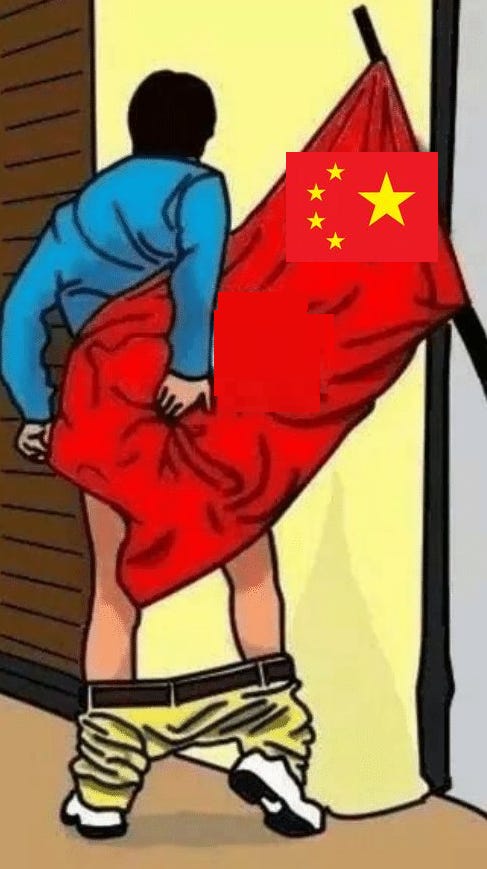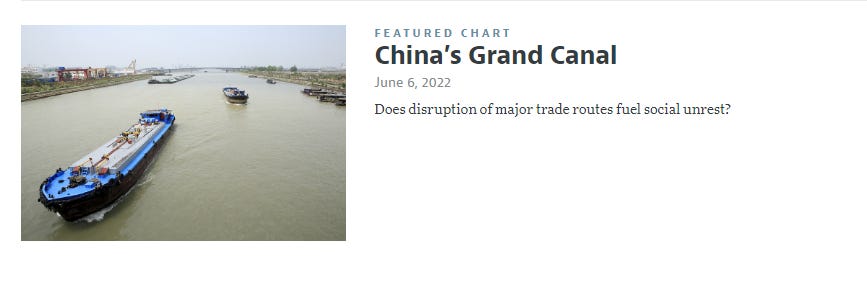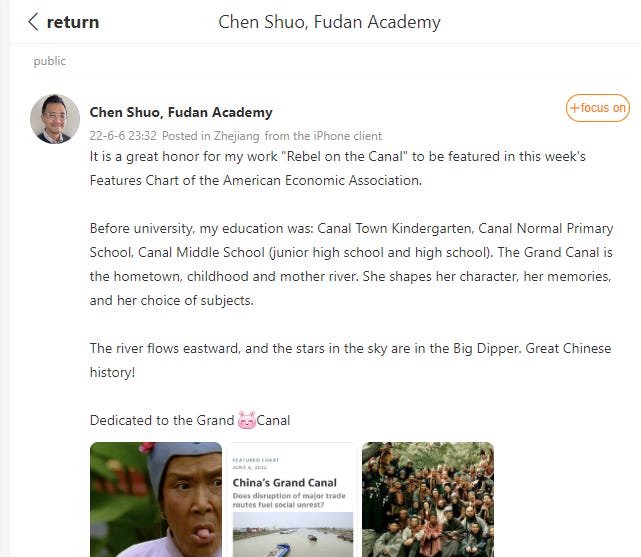Shuo Chen & Yiming Cao: The Men Who Made History
and by "made history" I mean "committed blatant research misconduct" and "committed treason against the motherland"
I sometimes write anti-China articles... this is not one of them. Today’s article is written from a pro-China and anti-West point of view. In fact, I consider reading and sharing this article to be the patriotic duty of any honest Chinese scholar.
This is because I am aiming to have an impact on Chinese universities and Chinese media, and the only media coverage they allow is pro-China and anti-West… so be it. I will work within those constraints because this is an important story that needs to be told to Chinese citizens who crave the truth. I won’t even mention Xinjiang once. Glory to the CCP!
In this article, I argue that Yiming Cao, a postdoctoral researcher at Stanford, and Shuo Chen, a professor of economics at Fudan University, conspired to maliciously and knowingly alter Chinese historical facts with the goal of lining their own pockets. In doing so, they prove themselves to be enemies of the Han people. A loyal party member would never fill the nation’s history books with lies. Who would want to live in a nation built upon a foundation of collective historical lies? Such a nation is a weak nation.
Perhaps most sinister of all: Cao and Chen conspired with Western institutions to rewrite history — the American Economic Association (AEA) and American Economic Review (AER) colluded to politely sweep this imbroglio under the rug. It is understandable that these Western institutions would want to maliciously alter Chinese history, but it is unforgivable and traitorous that Cao and Chen would do the same.
I contacted Cao, Chen, AEA & AER for the purpose of this article. None of them responded.
The purpose of this article, therefore, is to raise awareness of this research misconduct so that Chinese history textbooks are not filled with lies. Fudan University, specifically, considers this paper as a significant achievement and aggressively promotes it and brags about it. Fudan should take accountability for their corrupt role in promoting fraudulent history.
The AER paer is emphasized heavily in [Yiming’s] letters …. And according to his letter writer, a major contribution of the AER paper is that "it is the first paper to look at a truly PERMANENT labor market shock," which turns out to be completely untrue since the shock only lasted for less than a year, a fact that Cao conveniently left out in his paper. Had he discussed it honestly, the paper would have no chance of being published at all. If he is not punished for this dishonesty, it would be unfair to other honest JMCs who lose flyouts and offers to him.
— Anonymous
Demand side here. YC’s advisor said in the letter that the AER paper is a big deal because it is the first to show the effects of a “truly permanent labor market shock.”In reality, the authors conveniently hide the fact that the shock lasted less than a year. What a slap in the face……
— Anonymous
The Crime
As so many scandals do, this story first entered the public consciousness via EJMR. This 47+ page thread has been viewed 68,432 times, and if you search EJMR by “top posts this year” it comes in at #6:
These types of posts are precisely why EJMR is useful. It is one of the only checks and balances in the entire econ profession… which is why elite gatekeepers such as Esther Duflo hate it so much. They want unchecked power.
What makes this such an insane scandal is that everyone in the profession knows about it — the AER knows that fake Chinese history is published in their journal — and yet they are content to let it slide rather than take action (retract the paper). There is no ambiguity here. The paper is obviously and easily verifiable fraud, unlike most p-hacking cases where the authors can still plausible find excuses for their sample and specification choices. This is a fraudulent, paper but the AER is recalcitrant and doesn’t want to be seen as bending to the EJMR mob, so rather than follow proper research practice they choose to become complicit in the research misconduct themselves and hope it goes away.
Classic.
The corrupt AEA then legitimizes this fraud by plastering it on the front page of their website.
Shuo Chen then took to Weibo (the Chinese version of Twitter) to brag about being featured on the AEA website:
The balls on this guy. Let’s drill down to the comments section of his Weibo:
User: Dare to ask questions about when the canal is
Shuo: I'm still a real name at least haha
User: Has the fixed effect been added?
Shuo: So curious, why don't you just read the paper?
Here he is implicitly admitting to butchering the historical narrative of the Grand Canal, but oh well no biggie… “I’m still a real name at least haha.” Publishing papers is a game to these people — not science.
Their paper says that the 1826 grand canal closure was permanent while omitting that the canal reopened a year later in 1827. The canal was fully open between 1827 and 1840, but they pretend it was closed. The reason they blatantly (and knowingly) misrepresented the timeline of the event is that given the correct historical narrative, their "treatment effect" would become "pre-trend" and therefore there is no chance that this could have been published.
So they lie about the history of the Grand Canal. They knowingly distorted history about the Qing dynasty to get the paper accepted. This is worse than p-hacking. This is making up fake history.
They are definitely wrong here; this is not something that can be fixed by "re-running the analysis" or “tweaking the specifications” — the key historical narrative is wrong. The authors even cite a book multiple times by a Chinese historian, and that book is very clear about the canal closing only for a year. Here is another website that clearly said that such a shock is not a permanent shock.
This obvious fraud has been pointed out in public by Taisu Zhang, a historian at Yale:


@ZhangTaisu: This is an interesting paper, and the basic conclusion that Qing grain tribute trade routes had a large effect on regional socioeconomic stability is probably correct. However, there’s one big oddity in the results, which is that its effects begin with the first sea-shipping experiment by the Qing Court in 1826, instead of the more permanent sea shipping reforms in the later 1840s. As anyone who knows this history can tell you, the 1826 experiment lasted for a grand total of 1 year, and canal shipping resumed at normal levels shortly afterwards. It wasn’t until two decades later that more systemic changes were put in place. So why would a 1 year experiment have such a large and durable effect on local stability? You might say that local populations could anticipate the 1840s reforms after 1826, but that seems highly unlikely given the Imperial Court’s rapid backtracking. So what was the casual mechanism in the 20 years in-between? The paper really needs an answer for this.
Zhang even explicitly asked the authors to respond:

They ignored him.
The Non-Correction Correction
Instead of publicly responding to Zhang’s public critique, the authors added a blurb to a newer version of the paper:
For this reason, the operation of the canal was restored in the following year, and the government continued its investment in restoring and maintaining the canal for at least another two decades.
This note doesn’t fix anything. Their paper is still completely wrong.
Distort history to get the paper accepted, then revise history before publication?
Sounds chill.
Moving Forward
A couple of months ago, I published this article about fraud in Singapore Management University:
This scoop was picked up in the Singapore media: Business Times, Today Online, Mothership, and Hardwarezone. The nation of Singapore then instituted a nationwide crackdown on fraudulent academic credentials.
That is how a serious nation acts. If CCP decision-makers do anything less than institute an efficient and brutal crackdown on this corruption and fake history, they will be proving themselves to be morally inferior to the nation of Singapore. Simple as.
Furthermore, if China refuses to crack down here, this will be a huge loss for researchers focusing on Chinese economic history. No one will believe in your institutional details now. Your stature will be diminished on the world stage, and your scholars will be seen as a joke by the West.
Please share this article widely in China so that something can be done. Thanks.









Hi, you mistake the pictures of two chineses. They both are the pictures of Chen. While chinese looks similar to each other, if you wish people read your article seriously, you need to make it right. another typo: Yimingo Cao, ( should be Yiming Cao)
落汤鸡